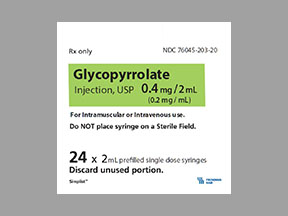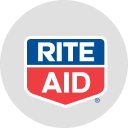
Glycopyrrolate Pf +rfid Coupons & Savings Card – Discount Prices from $8.33
glycopyrrolate pf
My prescription
Edit
2ML of 0.4MG/2ML, Glycopyrrolate Pf (1 Syringe)
Select pharmacy

CVS
$35.68
COUPON PRICE
Walmart
$8.33
COUPON PRICE
Rite Aid
$12.67
COUPON PRICE
Walgreens
$26.68
COUPON PRICEGlycopyrrolate Pf +rfid savings card
Show this card to your pharmacist
Walmart
$8.33
BIN
ID
PCN
GRP
019876
LHE281AFE3
CHIPPO
LHX
Powered by
Why is glycopyrrolate preferred over atropine?
Glycopyrrolate is often preferred over atropine because it has a longer duration of action and causes fewer central nervous system side effects. Glycopyrrolate does not cross the blood-brain barrier as easily as atropine, reducing the risk of sedation and confusion. Additionally, glycopyrrolate is less likely to cause tachycardia, making it a safer option for patients with cardiovascular concerns.
What is glycopyrrolate used for in ICU?
Glycopyrrolate is used in the ICU primarily to reduce secretions in the respiratory tract. It is an anticholinergic medication that helps manage excessive salivation and respiratory secretions, which can be particularly beneficial for patients who are intubated or undergoing certain procedures. Additionally, it may be used to counteract bradycardia or as part of preoperative medication to reduce the risk of aspiration.
What does glycopyrrolate do to the heart?
Glycopyrrolate can affect the heart by increasing the heart rate. It does this by blocking the action of acetylcholine on the heart, which reduces vagal tone and can lead to tachycardia. This effect is often utilized in clinical settings to counteract bradycardia or to reduce secretions during surgery.
Which condition would be a contraindication for the administration of glycopyrrolate?
Glycopyrrolate is contraindicated in individuals with conditions such as glaucoma, particularly narrow-angle glaucoma, as it can increase intraocular pressure. It is also contraindicated in patients with myasthenia gravis, obstructive uropathy, severe ulcerative colitis, toxic megacolon, and obstructive gastrointestinal tract diseases. Additionally, caution is advised in patients with tachycardia or other cardiac conditions where an increase in heart rate could be harmful.
What is glycopyrrolate used for in the respiratory system?
Glycopyrrolate is used in the respiratory system primarily as a bronchodilator to help manage chronic obstructive pulmonary disease (COPD). It works by relaxing and opening the airways in the lungs, making it easier to breathe.
